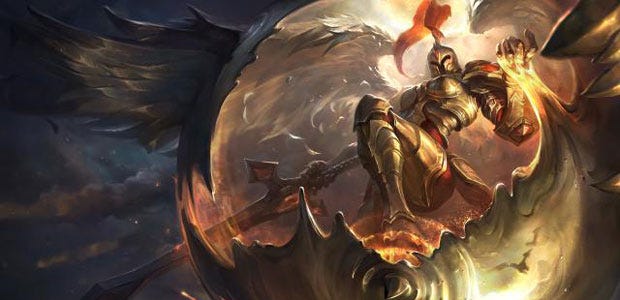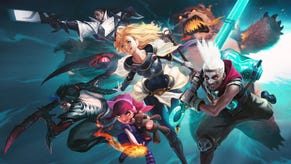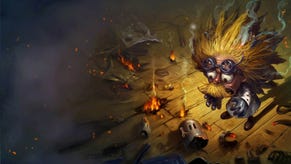LoL: Reform, Reward and Prisoner's Islands
Moba, mo problems?
Over on the League of Legends dev blog, Jeffrey Lin and his colleagues on the player behaviour team have been digging into ideas like reform and punishment for players who misbehave. The series of posts has just concluded so I'm going to highlight some of the interesting snippets they shared over the last few months. Some of the concepts are familiar but I don't think we've covered them on RPS before.
Reform
Players who play ranked games have different motivations than players who go for non-ranked. These include skill improvement, facing serious competition, being able to compare themselves to others and earning tangible rewards.
"Before ranked restrictions, we weren’t giving the hyper-competitive solo-queue player the right type of feedback at the right time," say the team. "By locking these players out of ranked queue, we throw up a barrier between them and what they are most motivated by. To take the barrier down, they have to improve their behavior to be more in line with what the community expects, reinforcing positive behaviors and promoting reform."
Apparently after identifying the motivation behind ranked play and designing penalties which tap into those, like ranked restrictions, the percentage of ranked games with high levels of negativity (for example, death threats, sexism, racism or homophobia) went down by 47% to 0.8% of all ranked games.
This was before I started playing League but good grief, that's a horrifying "before" statistic. [N.B. the comment section pointed out I'd misread the stat: "Down by 47% means reduced by 47%, not that 47% of games were toxic beforehand. So it would’ve been ~1.2% beforehand" - sorry!] Moderate negativity (no definition given) also went down from an eighth of ranked games to a tenth of ranked games.
Reward
The element of surprise is vital. If players know a reward schedule they can start to game it, only behaving well when they need to in order to fulfill those criteria. When there's uncertainty around the reward and when it will come you get players improving their behaviour across a wider range of matches.
"For positive players in the game, this won't really affect them and they'll just get surprises every so often for being awesome. For neutral players, this effort might convince some of them to put in that extra effort in a few more games to get the next surprise. For negatively behaved players, this effort might also encourage a few to change their ways although we expect the biggest impact to be with the neutral players."
Punishment
A lot of this segment was about how Prisoner's Island-type solutions don't work - shoving all the negative players into a queue together doesn't improve their behaviour. Low-priority queueing does exist in League but Lin points out that it's more of a last resort and is based on negative patterns of behaviour.
Ranked restrictions push players who have behaved negatively into non-ranked queues which has raised some questions which Lin tries to address:
"The key that makes ranked restriction different is that the overwhelming majority of players in normal draft are still neutral to positive. By slowly and intentionally introducing a very small minority of negatively behaved players and keeping them chat restricted during their path back to ranked play, we don’t disrupt the queue and players can compete in a more relaxed atmosphere as they work to reform."
In short, it's about social pressure.
Drevarius, who's a social systems designer for the game, also talks about chat restrictions which put a hard limit on the number of messages a player can send per game.
"Limiting the number of messages a player can send turns chat into a limited resource. This messaging “ammunition” can either go toward useful comms that help coordinate a successful gank or toward flaming an underperforming teammate. Chat restrictions challenge players with a resource dilemma and a moral decision."
The idea here is that the desire to win will make the helpful option the more desirable one.
And so...
Signing off, Lin points out that "League’s currently at an all-time low when it comes to AFKs and leavers, and the community’s taken a hard stance against racism, homophobia and sexism. Cumulatively, only 2% of games globally include excessive harassment, racist, homophobic,or sexist language."
Thinking about that 2%, it still feels high to me. It would be interesting to know how many matches a summoner plays each week on average so I could get a better feel for the reality but if you assume 10-15 games per week from a regular player they're still likely to run up against excessive negativity once a month and those negative experiences do stick in your mind.
To be fair, they do address that exact point at the end of the blog series ("There’s still work ahead, and knowing that you’re experiencing something rare doesn’t help when it’s still horrifying and disappointing to see in game, and we know negative experiences linger in a way positive moments don’t.")
I do really like the work the player behaviour team are doing and read it with interest every time they share new data or findings. They're currently working on expanding the Suggested Players idea so I'm keeping an eye out to see what they do there.
Something I've been pondering is perhaps a shepherd system. Dota has the option for one person to coach a team, but I was talking with someone from EVE University while at FanFest and it struck me that it would be cool to see if you could have the option to queue for matches while low level and have a coach-type spot reserved for a volunteer "teacher" player who'd be willing to answer questions or help out with basic strategising and things like ward placement. I feel like it would really help people who are trying to get into the game without the help of a pool of friends.








